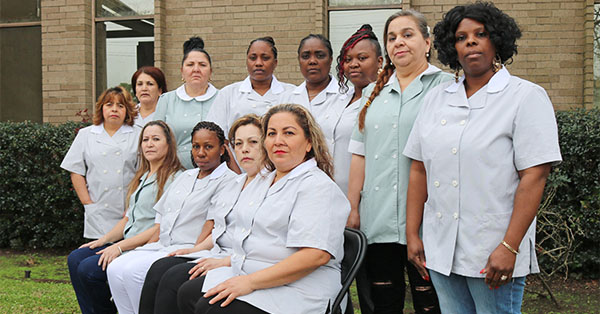NATIONAL
Their jobs took the biggest hit amid the COVID pandemic
New report finds that Black, Hispanic women and AAPI workers in leisure and hospitality have experienced the brunt of job losses
WASHINGTON, D.C. (May 21, 2021) — The new State of Working America employment report released Thursday by the Economic Policy Institute examines the types of jobs lost in the pandemic recession by industry, occupation, and demographic groups. Within the worst-hit sectors — leisure and hospitality and government — workers in the lowest average wage and lowest average hour occupations were hit the hardest and remain most damaged a year later, the report finds.
Even with a partial bounceback last summer after losing more than 8 million jobs last spring, the leisure and hospitality sector still faces the largest shortfall, with nearly 3.5 million fewer jobs in February 2021 than a year prior. Within leisure and hospitality, Black and Hispanic women were disproportionately impacted, with Asian Americans and Pacific Islanders (both men and women) suffering the most disproportionate losses of any group.
“Broad industry classifications miss important distinctions in economic vulnerability and job losses in the COVID-19 recession,” said Elise Gould, EPI senior economist and co-author of the report. “Occupational segregation — the fact that these workers are less likely to be found in higher-paid management professions — exposed Black, Hispanic, and AAPI workers to the worst of the job losses.”

In Washington state, frontline workers in the hospitality and food service industries, including thousands of UNITE HERE Local 8 members in Washington and Oregon and the families they support, continue to suffer the economic consequences of disproportionate pandemic-related job losses. Almost all of them were laid off last year in the face of decreased travel, cancelled meetings and hotel bookings, and suspended sporting events last year. And while the affected industries and corporations are beginning to rebound, the unexpected loss of their livelihoods since the pandemic began has been financially catastrophic for these workers and their families, and they face extraordinary debt as they have struggled to weather this crisis.
 TAKE A STAND — To support workers in need, UNITE HERE Local 8 is continuing to raise resources for its hardship fund. Please click here to donate today to support UNITE HERE Local 8 members who have weathered layoffs and financial devastation.
TAKE A STAND — To support workers in need, UNITE HERE Local 8 is continuing to raise resources for its hardship fund. Please click here to donate today to support UNITE HERE Local 8 members who have weathered layoffs and financial devastation.
The new EPI report found that after the leisure and hospitality industry, public-sector employment had the second-largest shortfall, with 1.4 million fewer jobs in February 2021 than in February 2020. The public-sector jobs shortfall is entirely in state and local governments, and most of those losses (72.0%) are in state and local government education employment.
These shortfalls do not account for either the number of jobs that would have been created in a growing economy had the COVID-19 recession not hit or for the growing demands the pandemic placed on education. Absent the COVID-19-driven recession, an estimated 2.4 million additional jobs could have been created. Adding these to the actual job losses since February 2020 implies that the U.S. labor market in February 2021 was short 11.9 million jobs.
“The pandemic recession is unusual in how focused its job losses were on low-wage workers,” said Melat Kassa, EPI research assistant and co-author of the report. “The American Rescue Plan makes important strides toward improving outcomes in coming months, but permanent structural reforms are needed to make sure the most vulnerable and historically disadvantaged in our labor market realize the benefits of a growing economy and are better protected during the next disaster.”
The EPI’s findings conform with those of “Highest Risk, Hardest Hit,” a report issued earlier this year by the Washington Labor Education and Research Center based on state employment data. It documented the high unemployment and financial challenges facing Washington workers — particularly hospitality workers, personal care and services, vehicle operators, and managers in those fields — whose normally essential jobs were shut down to protect our communities during the COVID-19 pandemic.
Read the full EPI State of Working America employment report here.





